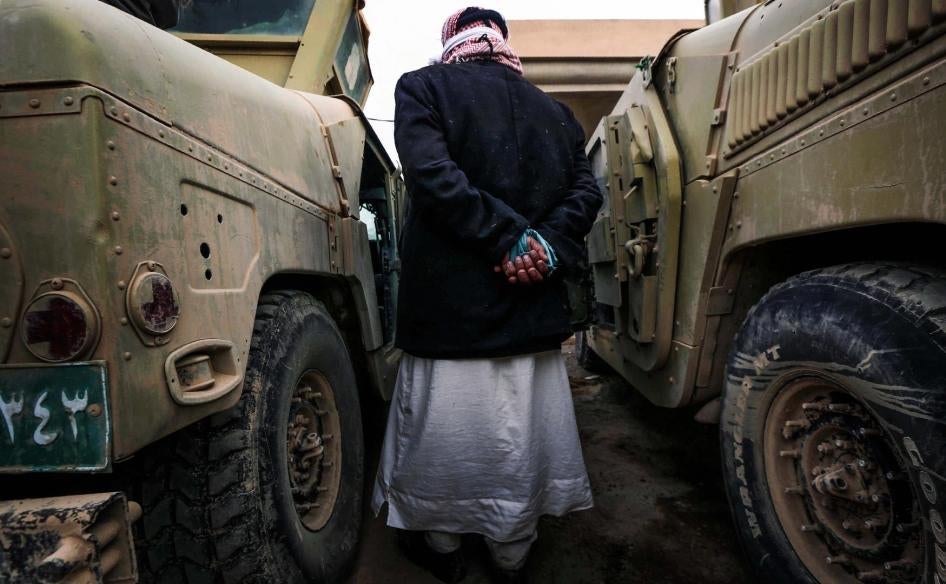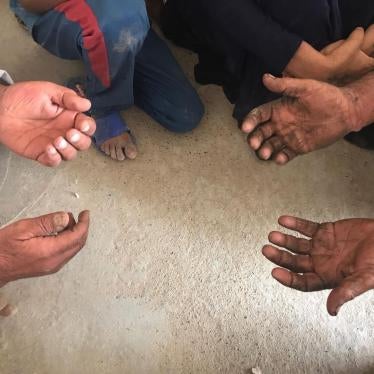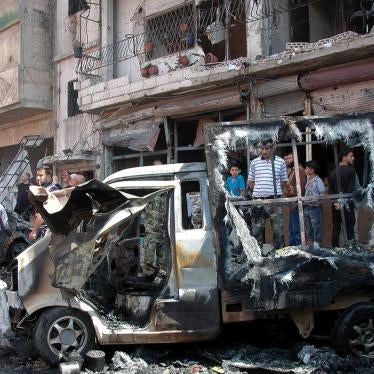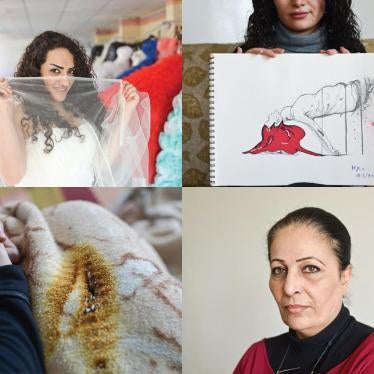(Baghdad) – The Iraqi government and Kurdistan Regional Government (KRG) are conducting thousands of trials of Islamic State suspects without a strategy to prioritize the worst abuses under Iraqi and international law, Human Rights Watch said in a report released today. The haphazard approach and rampant due process violations are likely to deny justice to the victims of the worst abuses during ISIS control of parts of Iraq.
The 76-page report, “Flawed Justice: Accountability for ISIS Crimes in Iraq,” examines the screening, detention, investigation, and prosecution of some of the thousands of Islamic State (also known as ISIS) suspects in Iraq. Human Rights Watch found serious legal shortcomings that undermine the efforts to bring ISIS suspects to justice. Most significantly, there is no national strategy to ensure the credible prosecution of those responsible for the most serious crimes. The broad prosecution under terrorism law of all those affiliated with ISIS in any way, no matter how minimal, could impede future community reconciliation and reintegration, and clog up Iraqi courts and prisons for decades.
“Iraq’s handling of ISIS trials are a missed opportunity to show its people, the world, and indeed ISIS that it is a nation ruled by laws, due process, and justice, capable of bringing accountability for the gravest crimes and reconciliation for all of the communities affected by this war,” said Sarah Leah Whitson, Middle East director at Human Rights Watch. “Iraqi justice is failing to distinguish between the culpability of doctors who protected lives under ISIS rule and those responsible for crimes against humanity.”
The report will be presented to government officials at roundtables in Erbil and Baghdad. It is based on information gathered in Erbil, Nineveh governorate, and Baghdad from November 2016 to July 2017. Researchers visited prisons holding thousands of ISIS suspects and courthouses in Nineveh, Baghdad, and Erbil where trials were taking place, and met with senior Iraqi and KRG officials. Human Rights Watch also interviewed at least 100 families of ISIS suspects, and dozens of people who suffered grave abuses at the hands of ISIS or lost loved ones as a result, as well as representatives of international nongovernmental organizations working on justice issues in Iraq, local lawyers, and other legal experts.
Human Rights Watch found that the Iraqi government and KRG have no national strategy to prioritize prosecutions of those responsible for the worst abuses, or to bring charges that capture the broad range of crimes ISIS members have committed. Authorities appear to be prosecuting all ISIS suspects in their custody under counterterrorism laws, primarily for ISIS membership, and not focusing on specific actions or crimes that may have been committed.
Human Rights Watch has identified at least 7,374 people who have faced these charges since 2014, with 92 sentenced to death and executed. The total number of people held as ISIS suspects is estimated by researchers to be at least 20,000 based on information provided by government officials.
Human Rights Watch research raised concerns about due process in the screening process for people leaving ISIS-controlled areas, including vetting procedures for lists of suspects compiled by local security forces. Those wrongfully identified as suspects may spend months in arbitrary detention.
Iraqi authorities detained ISIS suspects in overcrowded and in some cases inhuman conditions and failed to segregate children from adult detainees, Human Rights Watch found. Officials have ignored due process rights, including guarantees in Iraqi law to bring detainees before a judge within 24 hours, to grant access to a lawyer throughout interrogations, and to notify families of their detention and allow families to communicate with detainees. Detainees also alleged that authorities tortured them to confess to ISIS membership.
The overbroad counterterrorism laws that the Iraqi government and KRG authorities are using to prosecute ISIS suspects have allowed judges to charge people not implicated in specific violent acts, but alleged only to have been ISIS members or assisted ISIS. They include individuals who reportedly worked in ISIS-run hospitals or cooks who prepared food for fighters. The counterterrorism laws carry harsh sentences, including life in prison or the death penalty, even for ISIS membership.
“I had a case yesterday of an ISIS cook and I have recommended giving him the death penalty. How could the ISIS fighter have executed someone if he had not been fed a good meal the night before?”, a senior counterterrorism judge told Human Rights Watch.
Charging ISIS suspects with violating the counterterrorism laws, rather than specific offenses under the criminal code, is often easier as an evidentiary matter, especially for crimes that took place in the chaos of war. But that makes it more difficult to prioritize and punish the most serious crimes and to establish a thorough judicial record of the full range of the crimes ISIS committed in Iraq. The authorities have also made no efforts to solicit victim participation in the trials, even as witnesses.
ISIS suspects who can demonstrate that they joined the group against their will and did not participate in certain violent acts may be entitled to release after conviction under the General Amnesty Law passed in August 2016 (no.27/2016), but Iraqi judges are not consistently applying the law. The KRG has not passed an amnesty law for ISIS convicts or suspects, and a KRG spokesperson said none was under consideration.
The authorities should prioritize prosecuting those who perpetrated the most serious crimes for the full range of crimes committed while seeking alternatives to prosecution, such as participation in national truth-telling processes, for those ISIS members whose only crime was membership.
At a minimum, they should drop charges against those whose functions under ISIS contributed to the protection of human rights of civilians, such as individuals providing healthcare or other welfare services , Human Rights Watch said. For children in particular, authorities should consider alternatives to detention and criminal prosecution, and develop rehabilitation and reintegration programs to aid their return to society.
“Iraq’s amnesty law is no substitute for a national strategy that will provide fair trials and find alternatives to prosecution for those not involved in ISIS violence or serious abuses,” Whitson said. “Iraq needs a plan for reconciliation and truth-telling as much as it needs a plan to throw the worst criminals in jail.”










